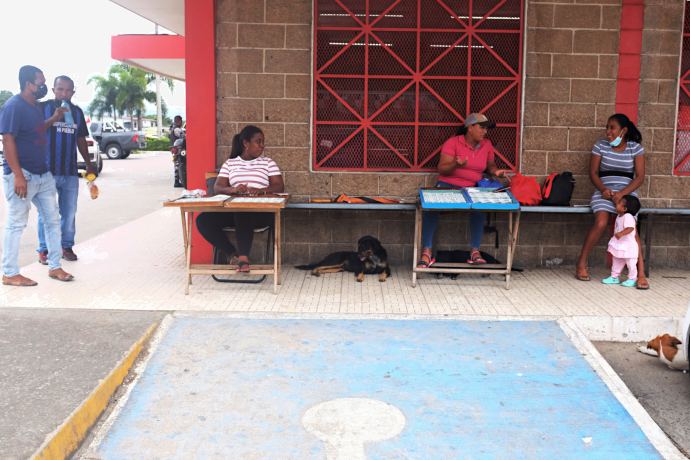A working day in Anton as the COVID epidemic winds down. In the left-center background, partly concealed, we see someone with a formal job, a “lince” motorcycle cop, part of the rapid response to robberies and other violent crimes unit. The two men at the left are secretarios on local buses – they collect the money, direct riders toward their buses, help those carrying unwieldy bags stow their belongings so as not to take up seating space and in an emergency might be called upon to drive. These might be formal or informal jobs. Some of the secretarios – and the relatively few secretarias – are relatives of the drivers. The drivers are small business operators who generally own their buses, get their routes via politicians and organize themselves into cooperatives. There are two women selling lottery tickets. The economic crisis has brought on a large increase in informal work, which includes selling lottery tickets. Getting a lottery ticket vendor job tends also to depend on political ties, but with more of them around each plum becomes that less juicy. The young woman with a toddler? Raising a kid is work even it many people don’t count it as such and it’s not a paying job. The kid is too young to have missed school from the pandemic, but prenatal care and pregnancy and infant nutrition programs may have been affected in a way that can cause educational effects. (It’s a scandal that governments are loathe to admit – let alone quantify – but one of Panama’s big educational problems is children with learning disabilities that began with malnutrition of their pregnant mothers or during early childhood.) Then there are three dogs standing guard – conveniently around the corner from a fond, from which some generous person may bring them a morsel of food. There is also the hope that if some maleante tries to rob one of the vendors, one or more of the dogs will take umbrage and a bite out of the offender. The education and employment of dogs is and long has been neglected here – there are hardly any leader dogs for the blind in Panama, for one example. Photo and caption by Eric Jackson.
World Bank warns of lasting economic effects from COVID-disrupted education
by Eric Jackson, in part from other media
The World Bank? A quasi-public international institution that’s owned and controlled by government shareholders and since its inception around the end of World War II has been dominated by North American and European governments. The institution tends to follow the current fads of the capitalist world, usually with a little lag time. But it also informs governments, public and private institutions and individuals about economic trends it studies, so plays a role if forming public policy orthodoxies.
Since the 1980s the prevailing capitalist ideal has been neoliberal – free trade, privatization, subsidies and tax breaks for businesses and wealthy individuals, economic globalization more or less on terms set by multinational corporations.
Whether or not that paradigm ultimately comes crashing down, in the 21st century it hasn’t done so well. The power of the fossil fuel industries as climate change and its resulting calamities get ever worse. Persistent inequalities in turn cause labor strife and political consequences. Establishment as they may be, for years some of the sharpest and most insightful critiques of the neoliberal order come from within the World Bank and its sister organization, the International Monetary Fund. These people are, after all, bankers who want to be fully informed about the odds of loans being repaid. Plus, the big international financial institutions are creatures of governments, whose leaders would prefer not to be run out of office when times get tough and constituencies get judgmental about it.
In the case of the COVID pandemic, the World Bank Group has issued an alarming report. They say that school closures during the lockdowns, and the exclusion of many students from online learning for reasons of no useful computer or no Internet signal in their homes, and their inability to acquire textbooks during these times, add up to an estimated 34 days of learning lost for each 30 days of lockdown. In Panama the bank points to job losses throughout the economy during these times and since, and a dramatic shift for those of working age from formal to informal employment.
Along with this there has been a spike in school dropout rates that has left us with some 267,515 “ninis” – ni estudiando ni trabajando, neither studying nor working – between ages 15 and 29. In that age group some 444,538 have found work, mostly at low-paying informal jobs with little opportunity for advancement. In the aggregate, in August of 2019, before the epidemic, unemployment for this age group was at 15% but by April it had climbed to 19.9%. In 2020 the gross income for this age group shrank 15%, and in 2021 another 12%. The bank warns that this has meant a drain on the entire work force’s skills that impedes a rapid and full economic recovery, and that for the individuals whose educations were disrupted there will be an estimated average 13% reduction of income over the coming few years and of perhaps 10% to 25% over their working lifetimes.
It’s not Panama alone in this jam, but we started out with poor national education achievement, as measured by the United Nations international student testing program, before COVID hit us. Worldwide, the bank reports, economic development has been set back decades by the pandemic.
So, what to do? The bank makes establishment-limited recommendations that the generations most severely affected may not accept. For education-deprived workers aged 19 to 24, subsidies to private businesses for a sort of apprenticeship program to make up for formal education, for those 15 to 18, some direct subsidies aimed at getting them back into school.
But WHO, in Panamanian society, are the people who have quit school and then made up for the deficits in their education? Labor leaders Saúl Méndez and Genaro López quit school to take construction jobs, but went on to study at night and get university degrees. It’s common enough in the militant SUNTRACS construction workers’ union that they have led. Less pronounced in Panama is an equivalent of the programs for the continuing education of women after they have left school to bear children, but in the United States and other industrialized countries those programs were promoted by the late 19th and early 20th century women’s suffrage movements.
Working class intellectuals? Labor at the forefront of an education movement to rebuild societies after a big disaster? That sort of stuff one would not expect on a bankers’ road map to recovery and it’s not there in the World Bank’s recommendations.
Nor does labor strife like what Panama saw in the middle of 2022 play much of a role in the bank’s calculations of the damage nor recommendations for repair. Even though one nearly worldwide reaction to the pandemic has been an upsurge in labor militancy. “Experts agree – you’re screwed” is something that younger working people may by and large refuse to accept.
The politics of such a rejection are also things about which bankers may not want to speak so loudly. From left and right, there are people who will blame the bankers for the bad economy.
It’s one of the key planks of neofascism in Panama, as embodied in the appeals of independent presidential candidate / PRD legislator Zulay Rodríguez Lu. Variants of the pitch will blame the Jews, or American expats for driving up the cost of housing, or migrants from other countries in Latin America for coming here and taking jobs away from Panamanians. Or the pitch might be to strip Panamanian citizenship and the right to live and work here from those who were born in Panama to foreign parents. This latter move would be something akin to what was attempted with respect to Zulay’s ethnic Chinese maternal grandparents under the short-lived 1941 Arnulfo Arias constitution.
Panama was one of the first Latin American countries to achieve near-universal literacy. There hasn’t been a need for anything like a students and teachers go out in the countryside to conduct a national literacy campaign movement as left-wing regimes conducted in Cuba, Nicaragua and Venezuela. But might we hear a variant of that from Panama’s communists, especially given that online teaching during the lockdowns was such a dud in rural areas with poor to nonexistant Internet service?
There are various segments of “the private sector.” Some rejoice at the failures of public education because it favors their kids against others of the same age. Others think about running a competent business and worry about finding skilled worker in order to be able to do this.
Color the World Bank serious, and pay attention to their warning. But that will not be the end of the discussion to which their report has added.
Contact us by email at fund4thepanamanews@gmail.com
To fend off hackers, organized trolls and other online vandalism, our website comments feature is switched off. Instead, come to our Facebook page to join in the discussion.
These links are interactive — click on the boxes












